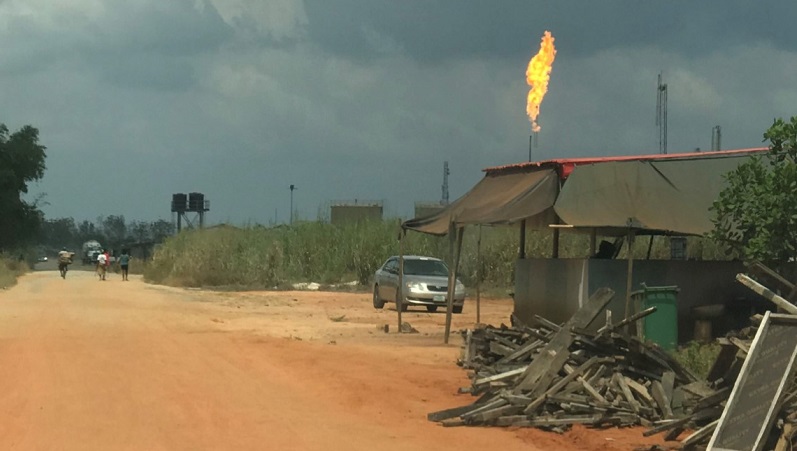The Nigerian government has pledged to end the burning of gas as a by-product of oil production by 2030, under its latest climate plan submitted to the UN.
Fossil fuel companies’ gas flaring account for a huge part of Nigeria’s emissions. At 75 million tonnes of Co2 equivalent a year, they outstrip the emissions from all 200 million Nigerians’ use of transport or electricity.
As gas flaring has been linked to health problems, communities in oil and gas producing regions like the Niger Delta have long campaigned against it.
Successive governments have promised to end the practice. They have made some progress. Nigeria reduced flaring by 70% between 2000 and 2020, according to the International Energy Agency, as a result of tougher penalties and incentives to capture and sell the gas.
But a national ban on flaring has loopholes, and penalties are low and weakly enforced. International oil majors report slow progress in eliminating wasteful flaring, for example Shell still flares more than 1m tonnes of gas a year worldwide.

Ogoni people demonstrating against Shell’s gas flaring in 1993 (Photo: Tim Lambon/Greenpeace)
Nigerian lawyer Olusola Olujobi, who has studied Nigeria’s anti-flaring regulations, said many European oil and gas companies were not allowed to flare gas in their home countries like Norway. “Why are they flaring gas in Nigeria?” he asked.
Olumide Idowu, co-founder of the youth-led NGO ICCDI Africa, visited Bony island in the Niger Delta last year. He told Climate Home News: “It was so devastating. I could not breathe because of the smell.”
Idowu is sceptical of whether the government will meet its 2030 target. To be successful, stakeholder engagement with local communities is necessary, he said.
Olujobi said meeting the target “is possible if the government is on top of its game” but he feared it was not focused on the issue. Getting the support of provincial governments is also important, he added.
Ukraine aims to grow economy without increasing carbon emissions
US-based Jonathan Banks, from the Clean Air Task Force, is working with the government on its anti-flaring drive. He said that a global focus on cutting methane emissions, strengthened by the recent IPCC report, “is lending itself towards a major push for cutting methane and flaring simultaneously in Nigeria”.
He added: “The government is on board. The companies I think recognise the importance of this. Almost every international oil company that’s engaged in Europe has pledged to reduce methane emissions as well as flaring. So the appetite is all there.”
In 2016, the Nigerian government launched a programme to commercialise the gas instead of burning it as a waste product. To enable it to be transported and sold, liquefied natural gas export terminals and pipelines have been built.
“It’s not just waste [to oil and gas companies],” Banks said, “now [they] can send it to Europe”.
Cop26 delegates from ‘red list’ countries will need to isolate for 5 days in the UK
Some of the gas is sold in local markets for use in electricity generation or cooking, replacing the wood fuel which most Nigerians still rely on.
Chukwumerije Okereke, a Nigerian professor in environment and development, supported the use of gas for cooking. He said that wood fuel “is the greatest source of debt for women, a major source of deforestation and deprives our girls of valuable time for education because they’re spending their time getting firewood”.
As well as helping fossil fuel firms sell the gas, the government has increased penalties for those found to be flaring it.
Banks said this has helped but loopholes remain. Companies are allowed to flare in an emergency and for safety reasons and have interpreted these exceptions broadly.
While significant progress has been made, the flaring which remains is the hardest to stop, Banks said, as it often takes places in the most remote areas.
As well as flaring, oil and gas companies emit methane in the production process, both deliberately and accidentally.
Venting is the deliberate release of methane from equipment like compressors and pneumatic controllers, for safety reasons. In many cases, it is possible to replace this equipment with lower or non-emitting equipment.
Leaks occur accidentally during the production process from wells, equipment and pipelines.
Alfredo Miranda-Gonzalez, from the Clean Air Task Force, said the government should mandate frequent leak detection and repair surveys. He added the international community should help with technology transfer, training and finance for detection equipment like optical gas imaging cameras, which cost upwards of $100,000.
